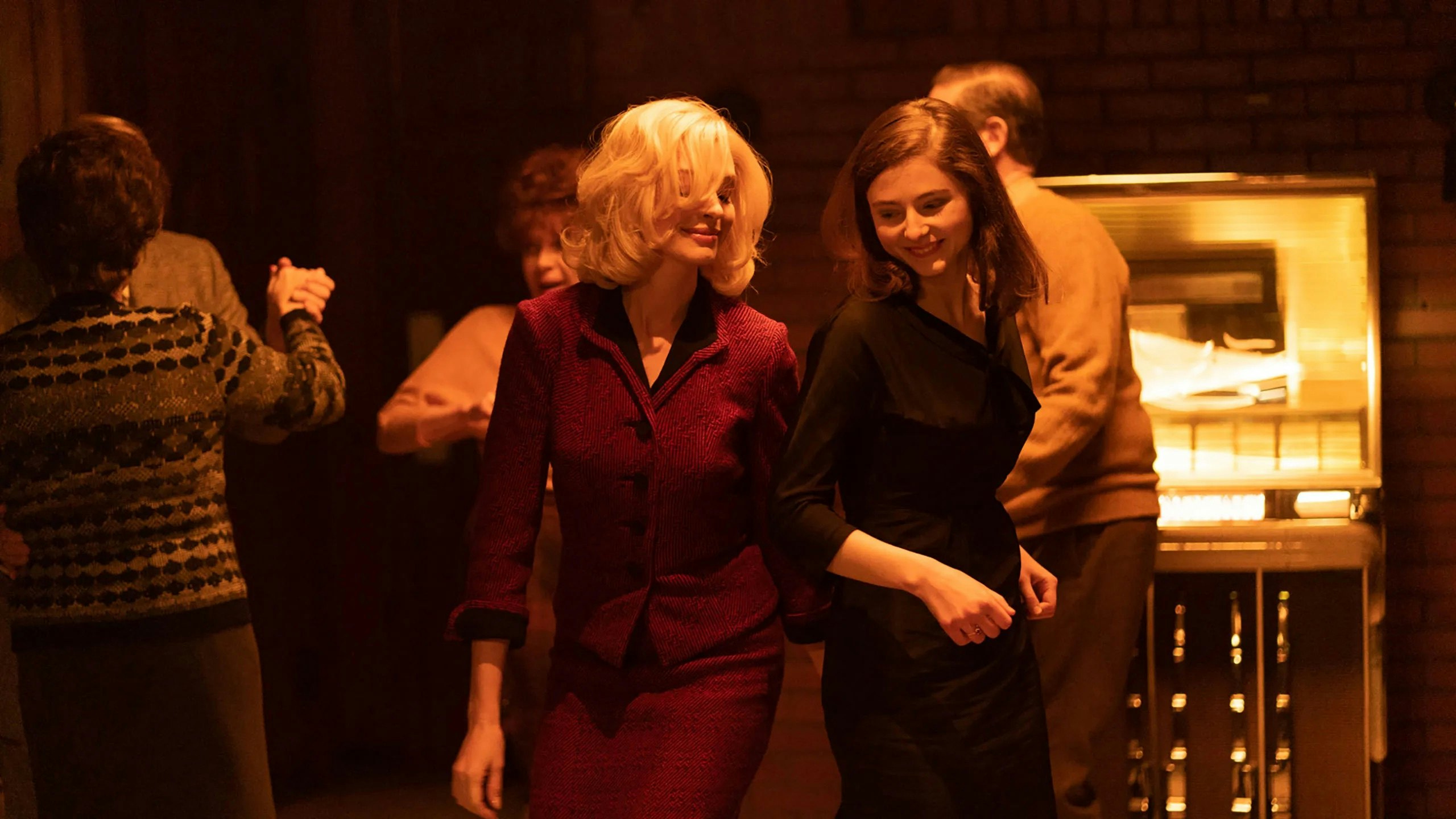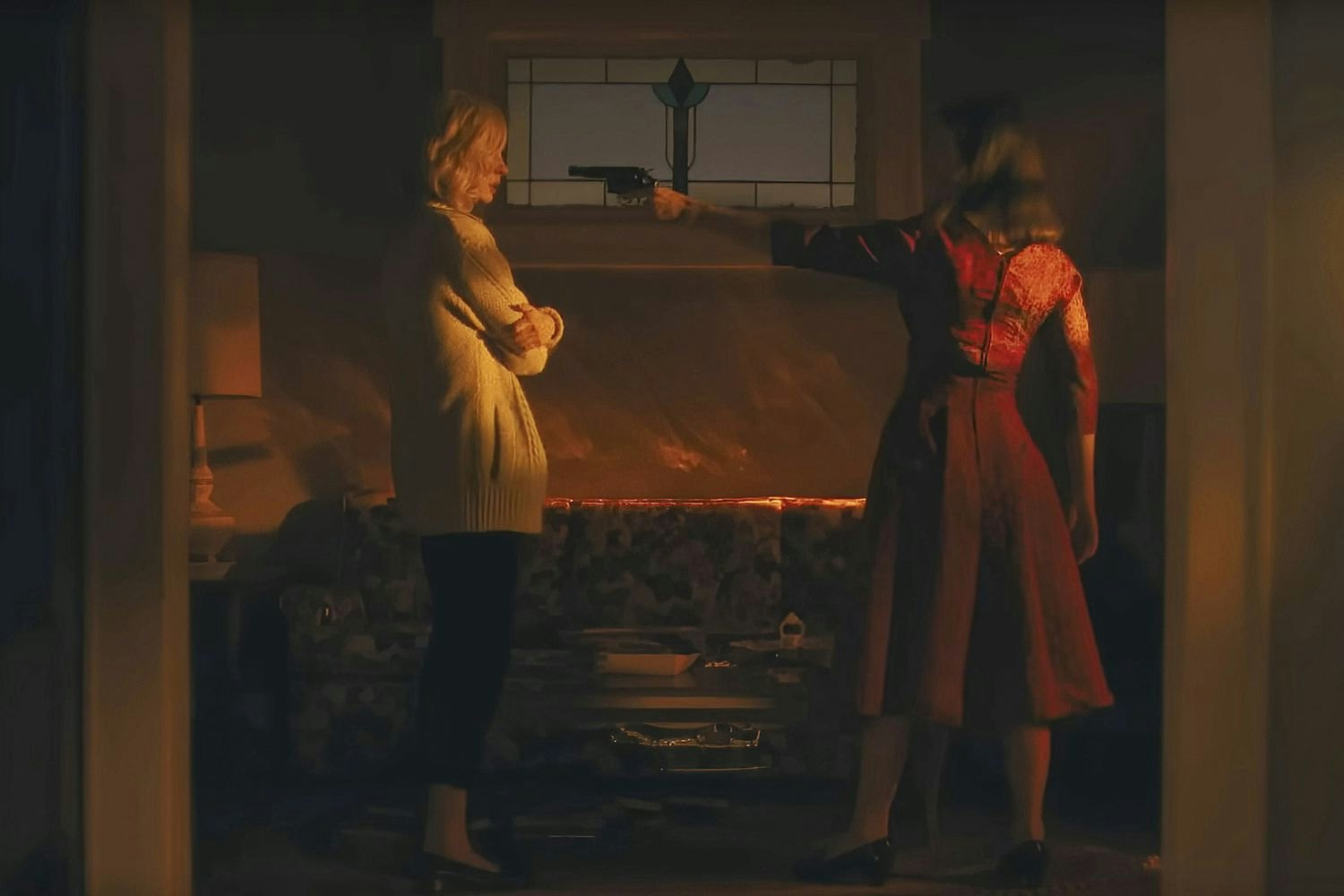
No one thinks much of Eileen. The mousy young secretary at a juvenile detention center played by Thomasin McKenzie in William Oldroyd’s deliciously twisted psychosexual thriller Eileen has spent her entire life being overlooked by her bitter co-workers, her alcoholic father, and even by herself. And in her anonymous New England small town where the people are as frigid as the icy, unforgiving weather, it seems unlikely anything will ever change. That is, until the glamorous new prison psychologist Rebecca (Anne Hathaway, relishing the chance to play the most femme of femme fatales) arrives to shake up the town — and Eileen’s life.
Based on the 2015 novel of the same name by Ottessa Moshfegh, Eileen is a moody, morbidly ghoulish maze of a movie that evokes the best Hitchcockian suspense thrillers. Director William Oldroyd, who proved his talent for depicting dangerous women in the Florence Pugh-led thriller Lady Macbeth, taps into a particularly dark and disturbed element of the noir movie with Eileen, which takes the genre to ambiguous new extremes.

Eileen begins at a slow trudge, introducing us to the quiet, reserved young woman trapped in her life. She spends her days being verbally abused by both her co-workers (who resent her youth) and her father (who resents that she’s alive and her mother isn’t). Otherwise, Eileen spends her days fantasizing about blowing her brains out or daydreaming about steamy trysts with the prison security guard. But it’s when Rebecca arrives in a red-hot convertible car that Eileen’s slow, deliberate pacing picks up speed, sweeping up the viewer in a whirlwind of obsessive delusions and simmering tensions that threaten to explode.
Eileen weaves a strange, twisty line through its titular character’s psyche, one that at first seems subdued and downtrodden but is plagued by fantasies that range from steamy to murderous. Oldroyd shoots the film with a frankness that lulls you into thinking this sad reality is all Eileen has before she suddenly shoots herself — a shocking daydream that interrupts the action before the film cuts back to real life. It’s just one of the many fantasies that punctuate the flow of Eileen, visions that become increasingly frequent after Eileen meets Rebecca and grows infatuated with the one woman who shows a keen interest in her.
“You must have brilliant dreams,” Rebecca says over drinks to Eileen, who is too awestruck by the glamorous, bleached-blond woman to respond. But it’s an astute, and slightly ironic, observation, as we see those dreams take form and slowly unveil the side of Eileen that she doesn’t show to anyone: one that’s a little rotten at the center.

Eileen delights in playing with our expectations for a sensually charged noir: Rebecca must be the confident temptress, and Eileen the naive ingénue. And Hathaway clearly delights in playing up Rebecca’s more mysterious and coquettish attributes, winking and teasing with Eileen before vaguely referring back to a sordid past. But it’s McKenzie’s deliberately evasive performance as Eileen that makes the film work. With her strong New England accent and McKenzie’s baby-faced demeanor, Eileen always looks like she’s out of place next to the perennially stylish Rebecca, but her hostile relationship with her father and her matter-of-fact reactions to the violence she encounters every day suggest all is not quite right with Eileen. It’s then that Eileen turns its pulpy noir conventions on its head with a twist so sudden it almost feels like a blunt object to the head.
Eileen is sometimes almost too opaque, to its detriment. Even as her darker impulses are revealed, Eileen remains a mystery, while Rebecca sometimes feels like a collection of characteristics. Moshfegh co-wrote the script with her husband, Luke Goebel, and while it’s an impressive screen debut for a novelist, her grasp on the characters’ inner dialogues and motivations is hindered by the visual medium. But Oldroyd more than makes do, cranking up the air of dread and the oppressive stink of resentment. And with Eileen’s story owing so much to Hitchcockian thrillers, Oldroyd can’t pass up a Vertigo homage or two, layering translucent images of Rebecca and Eileen, or dousing Eileen in bright neon lights in moments of ecstatic emotion. It all lends the film a sense of heightened stylishness that carries it through some of its slower moments.
Eileen is not just a successful sendup of the noir, it’s a deliciously pulpy thriller elevated by its two central performances. While its emotional impenetrability can sometimes frustrate, Eileen still manages to surprise and beguile.







